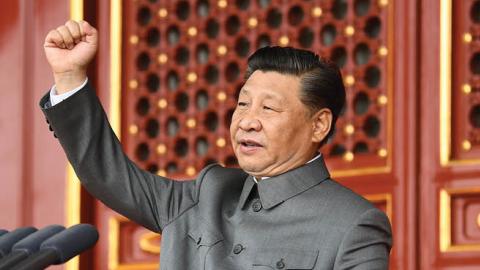Thirty-five years ago, the nuclear disaster known to the world as Chernobyl brought discredit at home and abroad to an inept and corrupt Soviet communist regime and signaled the end of the Soviet Union. In February 2020, I wrote a piece wondering whether the coronavirus outbreak, as we called it then, might spell a similar doom for China’s communist regime. Although no one saw fit to publish the essay then, the eerie parallels between the two disasters continue to be provocative.
It was on April 26, 1986, that the No. 4 nuclear reactor in the Chernobyl Nuclear Power Plant, near the city of Pripyat (in what is today Ukraine), suffered a massive explosion — large enough to blow the 2,000-ton reactor casting straight through the reactor building’s roof. Even so, it wasn’t until traces of radioactive fallout were detected at a Swedish nuclear facility the next day that Soviet citizens began to hear of what had happened from foreign news sources — as did the rest of the world.
The number of short-term deaths from the disaster (those who died immediately or in the weeks or months thereafter from radiation sickness) is about 54; estimates of long-term deaths as a result of exposure to radiation vary widely, from thousands to tens of thousands and even much higher.
The Chernobyl disaster cost the Soviet regime whatever credibility it had with its citizens and was the last nail in the coffin for the image of Soviet communism abroad. For the current Chinese communist regime in Beijing, the growing evidence that COVID does not have zoonotic origins — that it did not jump from animals to humans — as China still claims, but most likely leaked from a lab at the Wuhan Institute of Virology, points to culpability for a global disaster far worse than Chernobyl: so much so that it is not unreasonable to speculate about its implications for the regime’s survival.
Moreover, there is evidence that the Chinese government covered up the severity of the outbreak in China while allowing the virus to spread abroad. Thus it’s also possible to speculate that Beijing saw the COVID crisis not as a tragedy but as an opportunity to disrupt economies and societies around the world, to China’s advantage.
Could the international furor over COVID reach a point where Xi Jinping’s colleagues decide he makes a convenient scapegoat and turn him out? Given that he has modeled his reign after Mao’s ruthless one-man rule and grip on power, that may be unlikely. Even if it were to come to pass, Beijing’s total surveillance state would prevent Chinese citizens from learning anything like the truth of what happened in Wuhan, and why.
When the Chernobyl disaster struck, the Soviet regime was already on its last legs. By contrast, China’s bid for global hegemony is just starting to crest. It is an essential part of the Chinese Communist Party’s identity, regardless of what happens to Xi. China’s leadership has been engaged in a long march to global power since Mao Zedong came to power in 1949. Mao’s successors, starting with Deng Xiaoping, have committed themselves wholeheartedly to that epic journey.
Despite the friendly face he showed to the West, it was Deng who first described relations with the U.S. as a “cold war” and who made it clear to his colleagues, if not to the outside world, that the goal of his market reforms of the Chinese economy was to “enrich the state and strengthen the military.” What Westerners assumed were reforms to integrate China into the global economic system were actually steps aimed at dominating and controlling that system in order to achieve hegemony.
In the 1990s, Deng’s chosen successor as general secretary of the CCP, Jiang Zemin, launched China on a course of massive military buildup; in the first decades of this century, Hu Jintao engineered China’s high-tech total surveillance state, including the Great Firewall, and launched a Chinese cyber-offensive that stole hundreds of billions of dollars’ worth of intellectual property from an unsuspecting world — the biggest transfer of wealth in history.
Xi’s grandiose Belt and Road initiative and his Made in China 2025 master plan are only building on the superstructure his predecessors established to make China the world’s dominant superpower by any means necessary — possibly including using, or taking advantage of, the COVID pandemic as a way to hobble the economies of China’s rivals, particularly the United States.
Indeed, China’s surge into recombinant DNA research, as outlined in Xi’s 14th Five-Year Development Plan, could signal Beijing’s interest in scouting out an even more virulent agent as a potential bioweapon.
It’s to be hoped, though, that the world did draw lessons from Chernobyl, which revealed the moral bankruptcy of the regime that allowed it to happen and then tried to cover it up. COVID, in turn, has taught us a sobering lesson about the risks we all run in collaborating with or appeasing Beijing.
Three million dead, tens of trillions of dollars lost worldwide: It’s a terrible price to pay for ignoring the present and future threat posed by a power-obsessed regime.
Read in National Review

















